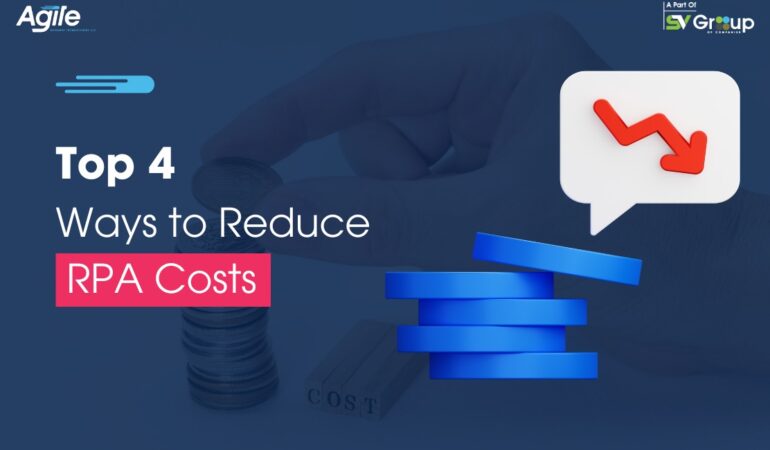Top 4 Ways to Reduce RPA Costs

Due to the skyrocketing inflation and uncertainty in the business environment, almost every organisation is focusing on reducing costs. As a result, organisations are asking their teams to cut back total ownership costs of RPA. While RPA itself is meant to reduce overall costs, it is not free.
The development and maintenance costs can easily reach thousands of dollars depending on the scale of implementation and its complexity. Unfortunately, many RPA platforms are increasing their pricing. It makes it all the more challenging to reduce the RPA costs.
However, there are still many ways through which organisations can cut back their RPA costs. As a leading RPA solutions company in UAE, Agile Managex Technologies has the experience and skills to help reduce RPA costs without impacting the quality or productivity.
Reducing RPA Costs
- Conduct an RPA Assessment
The first step is to conduct an RPA assessment. Unfortunately, most organisations implement RPA throughout the organisation in the hopes of realising better cost savings and improved productivity. What they fail to understand is that RPA is not the solution for all problems.
Such organisations end up with redundant RPA solutions that contribute very little to the organisation. Instead, they contribute to RPA waste. As most RPA vendors charge by the number of processes automated, the RPA costs are quite high. Therefore, the assessment’s purpose is to identify redundant processes that can be removed.
It will help bring down the total ownership cost of RPA. For example, an organisation is implementing RPA to automate email responses. Despite it, most customers ring up the customer helpline as the automated emails fail to answer their queries effectively. In such a situation, it is better to remove RPA from the emails to save costs.
After all, there is no point in using RPA on the emails when the customers are bound to call the helpline. It would be better to utilise the resources on hiring experienced customer representatives or saving the money for a rainy day. It can improve customer satisfaction, helping retain and attract clients.
- Selecting the Right RPA Tool
Another way to bring down the total cost of ownership is by selecting the right RPA platform. Unlike before, there are numerous platforms specialising in RPA. For example, you can opt between Microsoft Power Automate, UiPath, BluePrism, and others. Agile Managex Technologies can help you migrate to a new platform.
Read More:
The right tool can not only help bring down the costs but also improve your organisation’s productivity. For instance, if you opt for Microsoft Power Automate, you can benefit from the existing investments in Microsoft products. Power Automate’s licensing costs are also less compared to others.
- Citizen Development
Nowadays, most RPA platforms are low-code/no-code. It means that an individual without programming skills can contribute to RPA development. In simpler words, a marketing professional can help automate processes. All they need to do is understand the process and design the workflow accordingly.
How does this help reduce total ownership cost of RPA? Well, an organisation does not need to hire expert RPA developers. Instead, they can rely upon employees from other departments to contribute to the RPA process. Indeed, one might experience issues in the start.
However, with time, the non-programmers can become quite adept in RPA development. All it requires is some dedication and an eagerness to learn. It does not mean that you won’t require specialist RPA developers. You will still need them but not in the same quantity as before.
- Cloud-Based Infrastructure
Lastly, the most cost-effective way to reduce RPA costs is by leveraging cloud-based infrastructure. How will this save your organisation money? Simple. The organisation does not need to worry about upgrading its infrastructure or other capabilities when introducing new automations or moving to another platform.
Instead, the cloud service provider handles all these aspects. They offer scalability, allowing you to solely focus on RPA development and implementation. It is important to ensure that the cloud service provider has robust security processes in place. Otherwise, your data may be compromised.
Wrap Up
Due to the increasing uncertainty, businesses need to find active ways to reduce costs without compromising on efficiency and quality. As RPA is becoming mainstream, the above points can prove beneficial in benefitting from RPA without the high costs. Contact us if your organisation requires help with any aspect of RPA, including development, maintenance, or support.

Leave A Comment